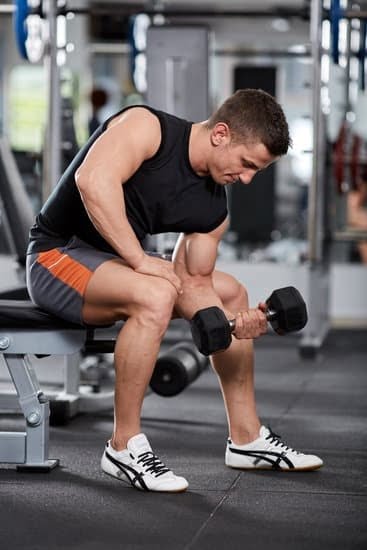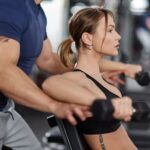Can you get fit without exercise? This question often sparks debate among fitness enthusiasts and professionals alike. In this article, we will explore the different aspects of achieving fitness beyond the realm of traditional exercise. From the role of nutrition and sleep to stress management and an active lifestyle, we will delve into holistic approaches to overall health and well-being.
When it comes to fitness, many individuals equate it solely with physical activity and exercise regimens. However, getting fit encompasses more than just breaking a sweat at the gym. It involves achieving a state of overall health that encompasses physical strength, endurance, flexibility, and mental well-being. While exercise plays a significant role in achieving these goals, there are other essential elements that contribute to overall fitness.
By exploring the impact of nutrition on our bodies, highlighting the importance of rest and sleep, discussing stress management techniques, promoting an active lifestyle, understanding muscle building without conventional exercise methods, emphasizing the significance of hydration for physical performance – we will shed light on alternative ways to achieve fitness beyond just hitting the gym. It’s time to broaden our perspective on what it means to get fit and consider holistic approaches that encompass various aspects of our lives.
The Role of Nutrition
When it comes to achieving fitness goals, many people focus solely on exercise and overlook the crucial role that nutrition plays in overall health and wellness. A balanced diet rich in essential nutrients is integral to getting fit, as it provides the body with the fuel and building blocks it needs to function optimally. In fact, without proper nutrition, achieving fitness goals can be significantly more challenging.
Nutrient-dense foods such as fruits, vegetables, lean proteins, and whole grains are key components of a healthy diet that supports fitness. These foods provide essential vitamins, minerals, and macronutrients that support muscle repair and growth, boost energy levels, and enhance overall well-being. In addition to fueling physical activity, a balanced diet can also aid in weight management, improve digestion, and reduce the risk of chronic diseases.
In essence, nutrition plays a fundamental role in achieving fitness without exercise or with minimal physical activity. While exercise certainly contributes to physical fitness, an individual’s dietary intake has a profound impact on their overall health and wellness. By prioritizing nutrient-dense foods and maintaining a well-balanced diet, individuals can effectively support their fitness goals without relying solely on traditional exercise routines.
| Nutrition & Fitness | Impact |
|---|---|
| Fruits & Vegetables | Provide essential vitamins and minerals for muscle repair and overall well-being |
| Lean Proteins & Whole Grains | Support muscle growth and boost energy levels |
| Balanced Diet | Aids in weight management, improves digestion, reduces the risk of chronic diseases |
The Power of Rest and Sleep
In the quest to achieve fitness, many individuals focus solely on diet and exercise, overlooking the crucial role of rest and sleep in overall health. Adequate rest and sleep are fundamental components of a healthy lifestyle and can significantly impact an individual’s fitness journey. Contrary to popular belief, taking time for rest and prioritizing quality sleep can have profound effects on fitness outcomes.
Quality sleep is essential for muscle recovery, hormone regulation, and overall well-being. During sleep, the body repairs muscle tissue that has been damaged during exercise or daily activities. Inadequate rest can lead to decreased muscle recovery, hindering progress in strength training or other physical activities. Additionally, lack of sleep can disrupt hormone levels related to appetite regulation, which can impact dietary habits and ultimately affect fitness goals.
In fact, research has shown that individuals who consistently get an adequate amount of high-quality sleep tend to have better endurance, improved performance during workouts, and faster recovery times compared to those who are sleep deprived. Essentially, adequate rest and quality sleep play a critical role in optimizing physical performance and achieving fitness goals. It is equally crucial as other aspects like proper nutrition or exercise habits.
| Benefit | Impact |
|---|---|
| Muscle recovery | Optimizes physical performance |
| Hormone regulation | Affects dietary habits |
| Better endurance | Improved workout performance |
Stress Management
Stress can have significant implications for physical health, often manifesting in the form of increased blood pressure, elevated heart rate, and muscle tension. The body’s response to stress can also lead to the release of cortisol, a hormone that has been linked to weight gain and decreased muscle mass. Long-term stress can weaken the immune system, making individuals more susceptible to illness and affecting their overall fitness levels.
There are various approaches to managing stress that can positively impact physical health and fitness. Mindfulness practices such as meditation and deep breathing exercises have been shown to reduce the production of stress hormones and promote relaxation. Engaging in hobbies or activities that bring joy and provide an outlet for creativity can also aid in stress reduction. Additionally, maintaining a support network and seeking professional help when needed can alleviate the negative effects of chronic stress on the body.
The Connection Between Stress Management and Fitness
By effectively managing stress, individuals can experience improved sleep quality, better nutrient absorption, and enhanced mental clarity. These factors contribute to an overall sense of well-being that
Adopting a holistic approach to fitness that includes stress management techniques alongside proper nutrition, sleep hygiene, hydration, muscle building strategies, an active lifestyle outside of conventional exercise routines, and nurturing the mind-body connection is key in achieving sustainable fitness goals.
Active Lifestyle
When it comes to getting fit, many people often associate it with hitting the gym or engaging in rigorous exercise routines. However, maintaining an active lifestyle is a key component of achieving fitness goals. Staying active doesn’t always mean spending hours at the gym or participating in intense workout sessions. Squeezing in physical activity throughout the day can contribute significantly to overall health and fitness.
Incorporating movement into daily routines is essential for those who may wonder, “can you get fit without exercise?” Simple activities such as taking the stairs instead of the elevator, walking or biking to nearby locations, and engaging in household chores can all contribute to staying active. Making small adjustments to daily habits can go a long way in keeping the body moving and promoting fitness without traditional exercise.
For individuals with desk jobs or those leading sedentary lifestyles, finding opportunities to stay active is crucial. Setting reminders to stand up and stretch every hour, incorporating short walks during breaks, and investing in a standing desk are ways to infuse physical activity into a predominantly stationary routine.
An active lifestyle not only supports physical health but also improves mental well-being and overall quality of life. Therefore, getting fit without exercise is indeed possible by prioritizing movement throughout the day.
Muscle Building Without Exercise
When many people think about building muscle, the first thing that comes to mind is hitting the gym and lifting weights. However, it is possible to build muscle without traditional exercise methods. Whether due to physical limitations or personal preference, some individuals may be unable or unwilling to engage in conventional workouts. Despite this, there are still ways to increase muscle mass and improve overall fitness.
Benefits of Resistance Training
While resistance training is a common method for building muscle, it is not the only option. Activities such as gardening, carrying groceries, or participating in activities that require physical exertion can also have an impact on muscle development. These movements may not resemble traditional weightlifting exercises, but they still provide a degree of resistance that can stimulate muscle growth.
Nutrition for Muscle Growth
Nutrition plays a pivotal role in muscle building. Consuming adequate protein and essential nutrients can support the body’s natural processes for repairing and growing muscles. Including high-quality sources of protein such as lean meats, dairy products, legumes, and nuts in one’s diet can aid in muscle development even without structured exercise routines.
Everyday Movement and Muscle Activation
Incorporating movement into daily activities can also contribute to muscle building. Activities like taking the stairs instead of the elevator, engaging in household chores such as sweeping or vacuuming, and simply being more active throughout the day can help stimulate muscles. Even fidgeting or tapping your feet while sitting can contribute to overall movement and potentially impact muscle activation.
By recognizing these alternative methods for building muscle without traditional exercise techniques, individuals who may struggle with or choose to avoid rigorous workouts
Hydration and Fitness
Staying hydrated is crucial for achieving and maintaining fitness goals. Hydration plays a significant role in physical performance, muscle function, and overall health. Here are some key points to consider when it comes to the importance of hydration for fitness:
- Optimum Physical Performance: Proper hydration is essential for optimal physical performance during exercise or any physical activity. Dehydration can lead to decreased endurance, cramping, and fatigue, making it difficult to achieve fitness goals.
- Muscle Function: Adequate hydration is necessary for proper muscle function. Water helps transport nutrients to the muscles and facilitates muscle contractions during exercise, which is essential for building strength and endurance.
- Overall Health: Staying hydrated is important for overall health, including digestion, circulation, and regulating body temperature. It also supports the body’s natural detoxification process, which can contribute to better overall wellbeing.
In order to maintain proper hydration levels for fitness, individuals should aim to drink an adequate amount of water throughout the day. The amount of water needed can vary based on factors such as age, weight, activity level, and climate. Paying attention to thirst cues and monitoring urine color can also provide insight into hydration status.
Mind-Body Connection
The mind-body connection plays a crucial role in achieving fitness goals, and this goes beyond physical exercise. It encompasses the relationship between our thoughts, emotions, and physical well-being. Here are some strategies to improve the mind-body connection and achieve fitness goals holistically:
- Practice mindfulness: Engaging in mindfulness activities such as meditation, deep breathing, or yoga can help reduce stress levels, improve focus, and promote overall well-being.
- Set positive intentions: Cultivating a positive mindset can have a powerful impact on physical health. Setting positive intentions for the day can help create a sense of purpose and motivation for achieving fitness goals.
- Manage stress: Chronic stress can have detrimental effects on both mental and physical health. Developing healthy coping mechanisms such as journaling, talking to a therapist, or engaging in hobbies can help manage stress and improve overall fitness.
In addition to these strategies, it is important to recognize that the mind-body connection also involves addressing any underlying emotional or psychological barriers that may hinder progress towards fitness goals. This can involve seeking professional support from therapists or counselors to work through any issues that may be impacting overall well-being.
Ultimately, by nurturing the mind-body connection through mindful practices, positive affirmations, stress management techniques, and professional support when needed, individuals can achieve holistic fitness without relying solely on traditional exercise Taking care of both mental and physical well-being is essential for long-term health and overall wellness.
Conclusion
In conclusion, the notion that exercise is the sole path to fitness is a misconception that has been debunked by the various factors explored in this article. Nutrition plays a crucial role in achieving overall health and fitness, as it provides the necessary fuel and nutrients for the body to function optimally. Additionally, prioritizing rest and sleep is essential for muscle recovery and maintaining energy levels, showcasing how taking care of one’s body holistically can contribute to fitness goals.
Furthermore, stress management and staying hydrated are also key components in the journey towards fitness. By addressing stress levels and ensuring proper hydration, individuals can support their bodies in reaching optimal physical performance. Moreover, actively incorporating physical activity into daily routines further reinforces the concept that fitness can be achieved without traditional exercise routines, offering readers alternative ways to stay active.
Ultimately, it is essential for individuals to recognize the interconnectedness of mind and body when pursuing fitness goals. The mind-body connection plays a significant role in overall well-being, emphasizing the importance of mental strategies alongside physical efforts.
By encouraging readers to consider holistic approaches beyond conventional exercise, they can explore new avenues on their journey towards improved health and wellness. So yes, you can indeed get fit without exercise by addressing various aspects of your lifestyle and well-being.
Frequently Asked Questions
How Do I Get Fit After No Exercise?
Getting fit after no exercise starts with setting realistic goals and gradually increasing physical activity. Starting with brisk walks, light cardio, and bodyweight exercises can help improve fitness levels over time.
Can Someone Be Naturally Fit?
Yes, some people can be naturally fit due to genetic factors such as a favorable metabolism or muscle composition. However, this doesn’t mean they don’t need to maintain their fitness through healthy lifestyle choices.
Why Do Some People Look Fit Without Working Out?
Some people may appear fit without working out due to genetics, a naturally active lifestyle, or having a lean body composition. Factors like diet, metabolism, and overall health also contribute to one’s appearance of being fit.

Passionate about providing useful information to anyone with an interest in the field of Personal Training, I strive to pass on to our readers quality information and to answer any questions about Personal Trainers, the work they do and how to become one.





